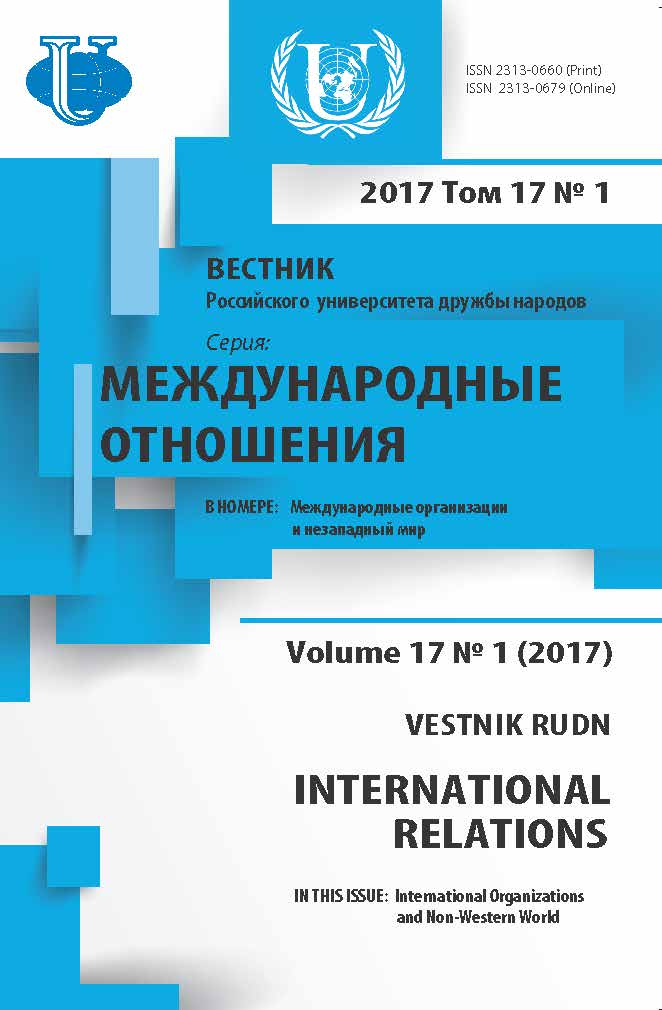Studies of international organizations in the Russian Federation. Interview with Doctor of political sciences, Professor, Director of the Center for International Institutions Research (CIIR) of RANEPA M.V. Larionova
- Authors: Bokeriya SA
- Issue: Vol 17, No 1 (2017): International organizations and Non-Western World
- Pages: 137-143
- Section: SCIENTIFIC SCHOOL
- URL: https://journals.rudn.ru/international-relations/article/view/15883
- DOI: https://doi.org/10.22363/2313-0660-2017-17-1-137-143
- ID: 15883
Cite item
Full Text
Abstract
Marina V. Larionova is a leading Russian expert in studying international institutions. In 2007 she defended her doctoral thesis on the theme: “Creating a common educational space in conditions of the development of integration processes in the European Union” at the Peoples’ Friendship University of Russia. In the period from 2002 to 2009 Marina Vladimirovna held the position of Vice-Rector of the National Research University “Higher School of Economics”, and now she is currently a professor at the Department of World Economy of the Faculty of World Economy and World Politics at HSE. Also in 2005-2016 she headed the Institute of International Organizations and International Cooperation of this University. Since 2014 Marina Vladimirovna is the Managing Director and Vice President for International Cooperation of the Russian Union of Industrialists and Entrepreneurs. Since 2015 she also heads the Center for International Institutions Research (CIIR) in RANEPA. M.V. Larionova has more than 70 scientific publications, is member of the Political Science Academy, University Association for Contemporary European Studies (UACES) and the president of the Association of Experts in the field of international development assistance. Marina Vladimirovna is also the chief editor of the scientific journal the International Organisations Research Journal (IORJ), a member of the editorial board of the Vestnik RUDN. International relations and a member of the editorial board of Global Summitry Journal - GSJ. In the interview, M.V. Larionova speaks about studies of international institutions (organizations) both in Russia and in the world, describes main schools and research methodology.
Keywords
References
- Dervis, K. (2016). Reflections on Progress: Essays on the Global Political Economy. Brookings Institution Press.
- Deutsch, K. W. (1957). Political Community and the North Atlantic Area: International Organization in the Light of Historical Experience. Princeton University Press.
- Haas, E. B. (1958). The uniting of Europe: political, social, and economic forces, 1950—1957. Stanford University Press.
- Larionova, M. V. (2015). South Africa’s BRICS Presidency: Regional Power at the Helm of a Global Governance Forum. Vestnik RUDN. International Relations, (1), 125—134. (In Russ.).
- Larionova, M. V., & Shelepov, A. V. (2016). Potential role of the NDB and AIIB in the global financial system. Vestnik RUDN. International Relations, 16 (4), 700—716. doi: 10.22363/2313-0660-2016-16-4-700-716.
- Mitrany, D. (1943). A Working Peace System. Royal Institute of International Affairs.
- Putnam, R. D. (1988). Diplomacy and Domestic Politics: The Logic of Two-Level Games. International Organization, 42 (3), 427—460.
- Safonkina, E. A. (2017). Asia-Pacific Economic Cooperation (APEC): Models of Engagement with International Institutions in the Process of Regional Governance. Vestnik RUDN. International Relations, 17 (1), 122—136. doi: 10.22363/2313-0660-2017-17-1-122-136. (In Russ.).
Supplementary files










